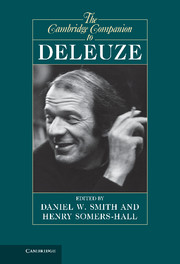Book contents
- Frontmatter
- Contents
- Contributors
- Abbreviations
- Introduction
- 1 Deleuze and the history of philosophy
- 2 Difference and Repetition
- 3 The Deleuzian reversal of Platonism
- 4 Deleuze and Kant
- 5 Phenomenology and metaphysics, and chaos
- 6 Deleuze and structuralism
- 7 Deleuze and Guattari
- 8 Nomadic ethics
- 9 Deleuze’s political philosophy
- 10 Deleuze, mathematics, and realist ontology
- 11 Deleuze and life
- 12 Deleuze’s aesthetics of sensation
- 13 Deleuze and literature
- 14 Deleuze and psychoanalysis
- 15 Deleuze’s philosophical heritage
- Bibliography
- Index
- References
15 - Deleuze’s philosophical heritage
unity, difference, and onto-theology
Published online by Cambridge University Press: 05 December 2012
- Frontmatter
- Contents
- Contributors
- Abbreviations
- Introduction
- 1 Deleuze and the history of philosophy
- 2 Difference and Repetition
- 3 The Deleuzian reversal of Platonism
- 4 Deleuze and Kant
- 5 Phenomenology and metaphysics, and chaos
- 6 Deleuze and structuralism
- 7 Deleuze and Guattari
- 8 Nomadic ethics
- 9 Deleuze’s political philosophy
- 10 Deleuze, mathematics, and realist ontology
- 11 Deleuze and life
- 12 Deleuze’s aesthetics of sensation
- 13 Deleuze and literature
- 14 Deleuze and psychoanalysis
- 15 Deleuze’s philosophical heritage
- Bibliography
- Index
- References
Summary
INTRODUCTION
In this chapter, I want to look at Deleuze’s philosophical heritage in two different senses. In the first part, I explore his relationship to perhaps the most influential philosopher of the twentieth century, Martin Heidegger. Heidegger plays a central role in Deleuze’s early philosophy, and even when in his later collaborations with Guattari their explicit references to Heidegger are dismissive, Heidegger’s influence can clearly be detected, particularly in their critiques of other philosophers. In the second part, I look at Deleuze’s own contribution to philosophy, and to see how this contribution has been assessed by one of the most influential contemporary French philosophers, Alain Badiou. For Heidegger, Deleuze, and Badiou, perhaps the central problem for philosophy emerges from thinking about totality. For all three, the traditional metaphysical view of totality, derived from Aristotle’s concept of paronymy, occludes rather than solves the problem of how we characterize our most general concepts. As we shall see, Heidegger’s diagnosis of metaphysics, as constituted by what he calls onto-theology, is shared by all three philosophers, while their responses to this diagnosis differ. Deleuze and Badiou both reject Heidegger’s poetics of being in favor of the language of mathematics, but the question I want to explore in the final part of the chapter is, which mathematics? The mathematics of the continuous, or the mathematics of the discrete?
- Type
- Chapter
- Information
- The Cambridge Companion to Deleuze , pp. 337 - 356Publisher: Cambridge University PressPrint publication year: 2012



